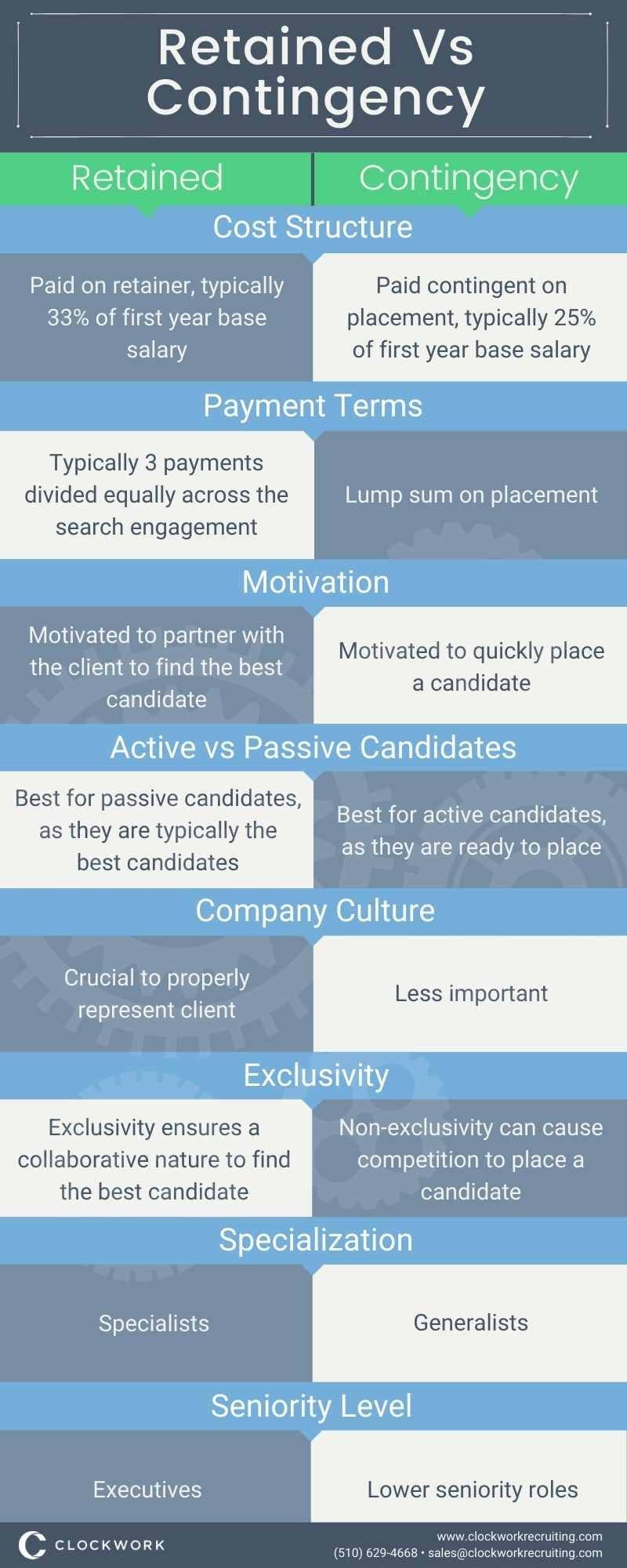Contingency Recruiting vs Retained Search: Which One Is Right for You?
Executive Recruiters operate under two primary business models: contingency and retained search. For the sake of clarity, executive recruiters conducting a contingency search are paid only upon the successful placement of a candidate; there's no upfront cost to the company. In retained search, on the other hand, the recruiter takes on more of a consultant role, earning money throughout the engagement for work done continuously.
These contrasts might seem subtle, but if you’re in the market for a recruiter, it’s important to understand them. It might mean the difference between finding the right candidate for your open position or making a detrimentally wrong hire.
Here’s what you need to know.

The main benefit of contingency is that it isn’t exclusive, so you can contract multiple recruiters to work on a project at once.
For companies, perhaps the biggest positive of working with a recruiter on a contingency placement is there’s no upfront cost entailed. It’s entirely pay-for-performance.
This arrangement is beneficial for a few reasons. The first is that it allows companies more flexibility in placing a candidate than committing to one particular recruiter. Moreover, recruiters working under a contingency model can at times be more inspired on the back-end to really put their all into finding you a quality candidate—after all, their payday depends on it.
On the other side of the coin, however, contingency recruiters tend to operate in a more transactional manner, focusing economically on placing candidates who are actively looking for jobs. They move fast, as they’re motivated to complete as many placements as they can as quickly as possible. And they tend to only fill roles for which straightforward job specs have been provided.
All this generally means that contingency recruiters focus on filling lower-level positions—and in doing that, sometimes, they can misunderstand a company’s needs.
The main benefit of a retained search, meanwhile, is a firm working on retainer work exclusively for you.
This arrangement generally results in the firm working harder to find you the best possible candidate for the role—regardless of if that person is looking for a job or not.
Of course, truly working to find your best possible candidate requires a more personalized and consultative workflow—which is why executive recruiters working on retainer are paid over the course of the engagement, regardless of if the position is ever filled or not.
Simply put, it’s a more hands-on process. These firms work with the client to identify what, exactly, their ideal candidate might look like. They collaborate to design a strategy that will increase the chances of finding that candidate. They conduct careful research and engage in purposeful outreach—the execution of the search strategy. All in all, it’s more of a deliberately multi-faceted effort.
Of course, because of this, executive recruiters conducting retained search get paid over the course of their work on the project, due to the more intense level of engagement.
As such, companies tend to hire executive recruiters on retainer when the role they need to fill is senior-level, or harder to fill, which makes sense. Investing in this kind of hyper-focused process and partnership is generally what placing senior execs requires. Not many CEOs are browsing Monster late at night, after all, signaling for contingency recruiters that they’re looking for something new.
Ultimately, what sort of firm you should partner with will depend on what you need.
Which is to say, before you go about hiring a recruiter to help you fill your next open position, think about the importance of the position itself.
What sort of investment does it necessitate? Will finding the right person for that position be possible with a contingency recruiter? Or do you need a firm who can work with you on a more personalized, strategic level?
That should be what drives your decision. If the position is critical, and if you think you will need a personalized approach, don’t make the mistake of going the contingency route because you fear the retainer fee.
Unfortunately, through my work at Clockwork, I see startup founders fall into this exact trap all the time. They’ll be in the market for making some key hires - huge roles, ones that could ultimately determine the fate of their company - but they’re unwilling to invest in the process of finding the best possible person. This is a bad idea. Your hiring decisions - especially early on - amount to some of the most important decisions you’ll make when building your company. Don’t make the wrong decision because you were unwilling to invest properly in the process.
Ask yourself: what’s the real ROI on a great hire for a critical role? And on the flip side, what’s the disruptive cost of a bad hire? Likely more than any retainer fee could be.

.png?width=50&name=Christian_Spletzer%20(1).png) By
By


